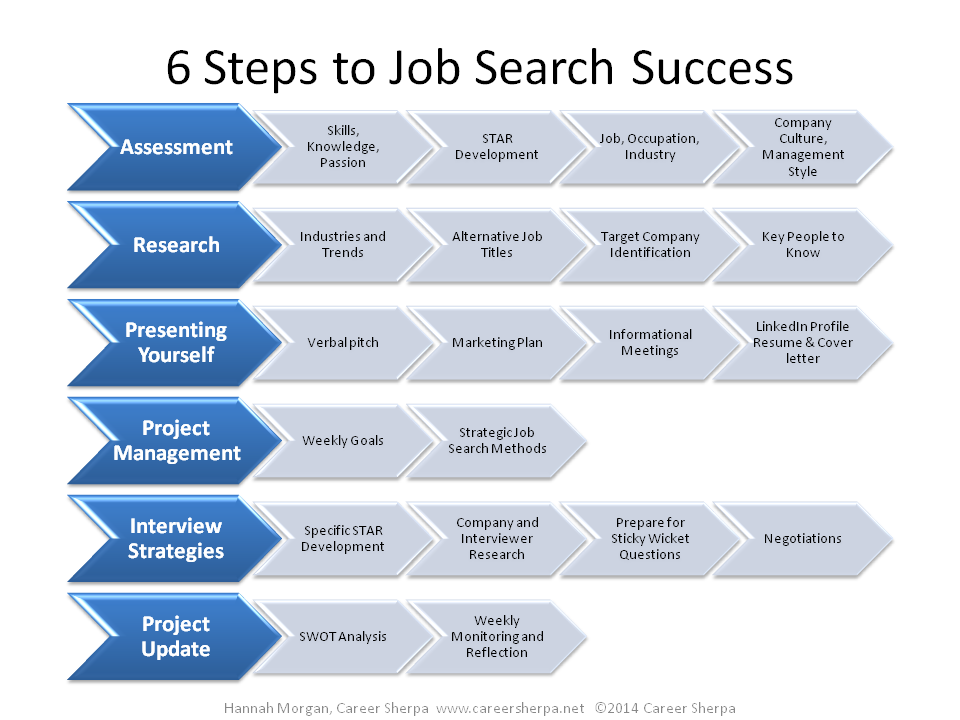To find your next job you’ll need a process. There are six steps to managing your job search you’ll want to follow. You’ll learn how to create a strategy to help land the right job.

The trouble with job search is that no one teaches you HOW to do it. And even if you did learn how to run a successful job search, some things have changed.
Today’s Job Search
Years ago, job search started by drafting a resume. (This was back when you had to type your resume and submit it through the mail.) Today, you use online applications and everything needs to be catered to the jobs you are applying to.
Here’s why you shouldn’t start your job search by writing a resume.
In order to craft a resume, you need to understand and include the skills employers are looking for on your resume. If you don’t know what those are, you’re resume may not have the right skills listed. And even more importantly, maybe you want more responsibility or to change roles or industry. How will you show that using your old resume?
That’s why this process starts with the really difficult step of self-assessment and market-place assessment.
Networking Is Key
Networking is the key activity to landing a new job.
It helps get your foot in the door and learn about jobs you may not have discovered on your own.
Randomly”spraying and praying” your resume around hoping that someone may know of something just doesn’t work.
That is why you need a networking strategy.
- Who do you need to meet inside target companies?
- Who is knowledgeable about your desired occupation?
- Who can you talk to and learn more about potential employers to target?
You need a clear message. (And a clear message can only happen after you have assessed and researched the job market and prepared your marketing materials.)
But what hasn’t changed is the overarching process – there are six steps to managing your job search.
6 Steps to Managing Your Job Search
If you follow these steps you’ll know what you’re supposed to be doing to conduct a successful job search.
Step 1: Assessment
Assessing yourself, and knowing what you want and need from your future job and employer is important. You want to align your purpose with the work you do. You also need to understand the demands in the labor market and industry trends.
Step 2: Research
Conducting more in-depth research will help you better understand what skills you should highlight and what employers are really looking for.
Step 3: Presenting Yourself
By this point in the process, you are ready to create your marketing materials (pitch, resume, LinkedIn profile, marketing plan)
Step 4: Project Management
The best way to keep your job search on track is to manage it like a project – set goals and deadlines and hold yourself accountable.
Manage your job search with a blend of proactive and reactive job search strategies – applying for jobs, networking, building an online presence, using social media and LinkedIn, partnering with external recruiters and more.
Step 5: Interviewing Strategies
In order to perform your best during job interviews, you’ll want to prepare in advance. Honing stories to fit job descriptions, practicing your answers out loud, and knowing what questions you’ll ask.
Step 6: Project update
Every couple of weeks, evaluate the progress you’ve made. Analyze what’s working and what’s not working. And you’ll need to keep track of your job search activities.
If planning and managing your job search were easy, you wouldn’t need a sherpa to guide you through the process. Sherpa-ing is what I do.

Hannah Morgan speaks and writes about job search and career strategies. She founded CareerSherpa.net to educate professionals on how to maneuver through today’s job search process. Hannah was nominated as a LinkedIn Top Voice in Job Search and Careers and is a regular contributor to US News & World Report. She has been quoted by media outlets, including Forbes, USA Today, Money Magazine, Huffington Post, as well as many other publications. She is also author of The Infographic Resume and co-author of Social Networking for Business Success.

